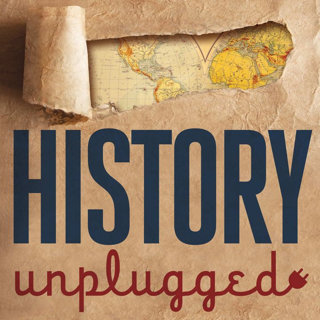
Why the Anabasis is the Second-Most Influential Greek Epic (After Homer’s Works)
Imagine being stranded thousands of miles deep in enemy territory with 10,000 soldiers, no allies, no clear way home, and the only means of escape was by foot. This was the predicament faced by Xenophon and the Greek mercenaries in Anabasis, one of the most gripping survival stories of the ancient world. In this episode, we delve into the incredible journey of these soldiers, their battles against the elements, rival armies, and even their own internal strife. Xenophon’s firsthand account is not just a tale of military strategy—it’s a timeless story of leadership, perseverance, and what it means to face impossible odds (it’s been referenced by Napoleon, Lawrence of Arabia, and the director of the 1979 movie “The Warriors”). Why has this 2,400-year-old narrative inspired everyone from ancient generals to modern filmmakers? To unpack the enduring power of Anabasis, we’re joined by Alex Petkas, host of The Cost of Glory podcast, who brings a fresh perspective to Xenophon’s masterwork. Alex shares his insights into Xenophon’s leadership style, his philosophical roots as a student of Socrates, and the universal lessons we can draw from the march of the 10,000.See omnystudio.com/listener for privacy information.
25 Helmi 48min

The American Revolution Would Have Been Lost Without a Ragtag Fleet of Thousands of Privateers
Privateers were a cross between an enlisted sailor and an outright pirate. But they were crucial in winning the Revolutionary War. As John Lehman, former secretary of the navy under President Ronald Reagan, observed, “From the beginning of the American Revolution until the end of the War of 1812, America’s real naval advantage lay in its privateers. It has been said that the battles of the American Revolution were fought on land, and independence was won at sea. For this we have the enormous success of American privateers to thank even more than the Continental Navy.”Yet even in the face of plenty of readily available evidence, the official canon of naval history in both Britain and the United States virtually ignores privateers. Privateers were owners of privately owned vessels granted permission by the new government to seize British merchantmen and men of war – filled in the gaps. Nearly 2,000 of these private ships set sail over the course of the war, with tens of thousands of Americans capturing more than 1,800 British ships. A truly ragtag fleet ranging from twenty-five-foot-long whaleboats to full-rigged ships more than 100 ft long, privateersmen were not just pirates after a good loot – as too often assumed – but were, instead, crucial instruments in the war. They diverted critical British resources to protecting their shipping, played a key role in bringing France in as an ally, replenished much-needed supplies back home, and bolstered morale. Today’s guest is Eric Jay Dolin, author of “Rebels at Sea: Privateering in the American Revolution.” The story of the founding of the U.S. Navy during the Revolution has been told many times – yet often missing from maritime histories of the period is the ragtag fleet of private vessels that were, in fact, critical to American victory. Privateering provided a source of strength that helped the rebels persevere. Although privateering was not the single, decisive factor in beating theBritish—there was no one cause—it was extremely important nonetheless.See omnystudio.com/listener for privacy information.
20 Helmi 59min

Did Lincoln Save Global Democracy or Undermine It Using Wartime Powers?
Did Abraham Lincoln preserve democracy during the Civil War, or did he endanger it in the process? To explore this paradox, we’re joined by renowned historian and Lincoln scholar Allen Guelzo, author of Our Ancient Faith. Guelzo takes us deep into the high-stakes decisions of Lincoln’s presidency, from the suspension of habeas corpus to the Emancipation Proclamation. He argues that Lincoln’s vision of democracy was rooted in a moral imperative to save the Union as a global symbol of self-governance. But was his willingness to push the boundaries of executive power a necessary evil—or a dangerous precedent? We discuss how Lincoln reconciled his wartime decisions with the principles of the Founding Fathers, why the 1864 election might be democracy's greatest test, and how his book, Our Ancient Faith, sheds light on Lincoln’s belief in the Union as a sacred trust. Whether you see Lincoln as the Great Emancipator or the reluctant authoritarian, this episode will leave you rethinking what it means to lead a democracy in its darkest hour.See omnystudio.com/listener for privacy information.
18 Helmi 57min

The 1541 Spanish Expedition Down the Amazon to Find the Imaginary “El Dorado” and Valley of Cinnamon
As Spanish conquistators slowly moved through Latin America, they encountered levels of wealth that were unimaginable. Most famously, Incan Emperor Atahualpa was captured by Francisco Pizarro and paid a ransom of a room filled with gold and then twice over with silver. The room was 22 feet long by 17 feet wide, filled to a height of about 8 feet. Such events fired the imaginations of the Spanish, who created myths such as of El Dorado, the “gilded man” who, legend held, was daily powdered from head to toe with gold dust, which he would then wash from himself in a lake whose silty bottom was now covered with gold dust and the golden trinkets tossed in as sacrificial offerings. The story was fake but it lead to real expeditions, some of which were so dangerous that they nearly killed party members. Such is the 1541 expedition led by Gonzalo Pizarro, Francisco’s brother, to find El Dorado, and his well-born lieutenant Francisco Orellana down the Amazon to find these riches. Today’s guest is Buddy Levy, author of River of Darkness: Francisco Orellana and the Deadly First Voyage through the Amazon. He reconstructs the first complete European exploration of the world’s largest river and the relentless dangers around every bend. Quickly, the enormous retinue of mercenaries, enslaved natives, horses, and hunting dogs are decimated by disease, starvation, and attacks in the jungle. Hopelessly lost in the swampy labyrinth, Pizarro and Orellana make a fateful decision to separate. While Pizarro eventually returns home barefoot and in rags, Orellana and fifty-seven men continue downriver into the unknown reaches of the mighty Amazon jungle and river. See omnystudio.com/listener for privacy information.
13 Helmi 40min

Everyday Life for the 500K German POWs House in America During World War Two
During World War II, approximately half a million German prisoners of war were held in the United States, housed in 700 camps spread across the country, from Florida to Maine. These POWs were treated in accordance with the Geneva Conventions, often working in agriculture and other industries to alleviate domestic labor shortages. Today, evidence of these POW camps has all but vanished, and with them the harrowing knowledge of what happened beyond the battlefield. But today’s guest, William Geroux (Jer-oh), author of “The Fifteen: Murder, Retribution, and the Forgotten Story of Nazi POWs in America,” not only exposes the forgotten history of these POW camps on American soil, but of the Nazi power games that dominated life within them. While German prisoners were protected by the Geneva Convention and generally treated fairly by their American captors, ardent Nazis in dozens of the camps began to punish and attack their fellow German inmates who failed to live up to Nazi ideology. What followed was a grisly series of murders in the heart of the United States.See omnystudio.com/listener for privacy information.
11 Helmi 1h 2min

The Arsenal of Democracy: How the Revolver and Repeating Rifle Democratized Gun Ownership and Armed the United States
The United States is the most heavily armed nation in the world, with an estimated 400 million guns in private hands. But few know that this legacy can be directly traced back to a handful of gunmakers who worked in the Springfield Armory of Massachusetts in the early 1800s. Their names became synonymous with American guns—Colt, Smith, Wesson, Winchester, and Remington among them – and they made firearms portable, powerful, rapid firing, and distinctly American. They also created the nation’s industrial base by making guns out of interchangeable parts, becoming early adopters of the assembly line process. Today’s guest is John Bainbridge, Jr., author of Gun Barons: The Weapons That Transformed America and the Men Who Invented Them. More than just keen inventors and wily businessmen, these iconic gun barons were among the founding fathers of American industry. Their visionary work in the development of rapid-fire weaponry helped propel the U.S. into the forefront of the world’s industrial powers in the mid-nineteenth century.See omnystudio.com/listener for privacy information.
6 Helmi 56min

Owning Land Was The Best – and Usually Only – Way to Be Rich in the Ancient World
For millennia, humans eked out survival atop the surface of the Earth and land had no unique value. Eventually, however, humans turned land into an advantage. For several thousand years, control of land meant control of natural resources, like water and wild animals. For several thousand more years it meant agricultural production, raising domesticated animals, harvesting timber. And finally, land became economic might invested in Kings, chiefs, and political leaders around the globe. Large landowners sat atop the pyramid of social hierarchy. Today’s guest is Michael Albertus, author of “Land Power: Who Has It, Who Doesn’t, and How That Determines the Fate of Societies.” We see how modern history has been defined by land reallocation on a massive scale. From the 1500s on, European colonial powers and new nation-states shifted indigenous lands into the hands of settlers. The 1900s brought new waves of land appropriation, from Soviet and Maoist collectivization to initiatives turning large estates over to family farmers. The shuffle continues today as governments vie for power and prosperity by choosing who should get land.See omnystudio.com/listener for privacy information.
4 Helmi 44min

Benjamin Franklin – In the 200 Years After His Death – Funded New Businesses, Supported Boston and Philadelphia, and Play Pranks
When Benjamin Franklin died on April 12, 1790, he made a final bet on the future of the United States -- a gift of 2,000 pounds to Boston and Philadelphia, to be lent out to tradesmen over the next two centuries to jump start their careers. Each loan would be repaid with interest over ten years. If all went according to Franklin’s inventive scheme, the accrued final payout in 1991 would be a windfall. Today’s guest is Michael Meyer, author of Benjamin Franklin’s Last Bet. He traces the evolution of these twin funds as they age alongside America itself, bankrolling woodworkers and silversmiths, trade schools and space races. Over time, Franklin’s wager was misused, neglected, and contested—but never wholly extinguished. Franklin’s stake in the “leather-apron” class remains in play to this day, and offers an inspiring blueprint for prosperity in our modern era of growing wealth disparity and social divisions.See omnystudio.com/listener for privacy information.
30 Tammi 37min





















